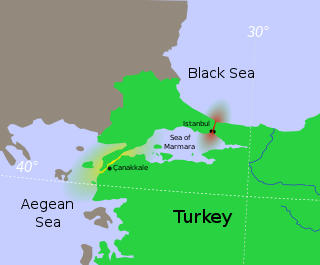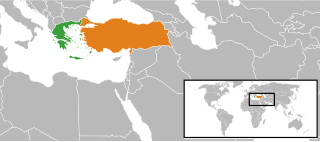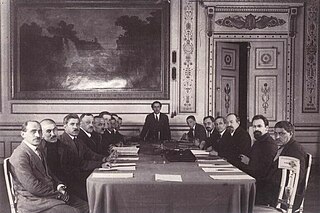 W
WThe Chanak Crisis, also called the Chanak Affair and the Chanak Incident, was a war scare in September 1922 between the United Kingdom and Turkey. Chanak refers to Çanakkale, a city on the Anatolian side of the Dardanelles Strait. The crisis was caused by Turkish efforts to push the Greek armies out of Turkey and restore Turkish rule in the Allied-occupied territories, primarily in Constantinople and Eastern Thrace. Turkish troops marched against British and French positions in the Dardanelles neutral zone. For a time, war between Britain and Turkey seemed possible, but Canada refused to agree as did France and Italy. British public opinion did not want a war. The British military did not either, and the top general on the scene, Sir Charles Harington, refused to relay an ultimatum to the Turks because he counted on a negotiated settlement. The Conservatives in Britain's coalition government refused to follow Liberal Prime Minister David Lloyd George, who with Winston Churchill was calling for war.
 W
WThe Greek genocide, including the Pontic genocide, was the systematic killing of the Christian Ottoman Greek population carried out in Anatolia during World War I and its aftermath (1914–1922) on the basis of their religion and ethnicity. It was instigated by the government of the Ottoman Empire and the Turkish national movement against the indigenous Greek population of the Empire and included massacres, forced deportations involving death marches, summary expulsions, arbitrary execution, and the destruction of Eastern Orthodox cultural, historical, and religious monuments. According to various sources, several hundred thousand Ottoman Greeks died during this period. Most of the refugees and survivors fled to Greece. Some, especially those in Eastern provinces, took refuge in the neighbouring Russian Empire.
 W
WRelations between the Greek and the Turkish states have been marked by alternating periods of mutual hostility and reconciliation ever since Greece won its independence from the Ottoman Empire in 1830. The two countries have faced each other in four major wars—the Greco-Turkish War (1897), the First Balkan War of 1912 to 1913, the First World War and finally the Greco-Turkish War (1919–22), which were followed by the Greco-Turkish population exchange and a period of friendly relations in the 1930s and 1940s. Both countries entered NATO in 1952. Relations deteriorated again after the 1950s due to the 1955 Istanbul pogrom, the Cyprus issue, and the expulsion of the Istanbul Greeks in the 1960s, the 1974 Cypriot coup d'etat, immediately followed by the Turkish invasion of Cyprus in 1974, the Imia/Kardak military crisis in 1996 and subsequent military confrontations over the Aegean dispute. A period of relative normalization began after 1999 with the so-called "earthquake diplomacy", which notably led to a change in the previously firmly negative stance of the Greek government on the issue of the accession of Turkey to the European Union. As of 2020, military tensions have risen again due to conflicts over maritime zones in the Aegean and Eastern Mediterranean.
 W
WTurkey officially recognized Montenegro on June 12, 2006. Diplomatic relations between the two countries were established on July 3, 2006. High level visits and contacts between the two countries continue intensively and successfully. Both countries are full members of the Union for the Mediterranean, Council of Europe and NATO.
 W
WThe partition of the Ottoman Empire was a geopolitical event that occurred after World War I and the occupation of Constantinople by British, French and Italian troops in November 1918. The partitioning was planned in several agreements made by the Allied Powers early in the course of World War I, notably the Sykes-Picot Agreement, after the Ottoman Empire had joined the Ottoman–German Alliance. The huge conglomeration of territories and peoples that formerly comprised the Ottoman Empire was divided into several new states. The Ottoman Empire had been the leading Islamic state in geopolitical, cultural and ideological terms. The partitioning of the Ottoman Empire after the war led to the domination of the Middle East by Western powers such as Britain and France, and saw the creation of the modern Arab world and the Republic of Turkey. Resistance to the influence of these powers came from the Turkish National Movement but did not become widespread in the other post-Ottoman states until the period of rapid decolonisation after World War II.
 W
WThe Treaty of Kars was a treaty that established the borders between Turkey and the three Transcaucasian republics of the Soviet Union, which are now the independent republics of Armenia, Georgia and Azerbaijan. The treaty was signed in the city of Kars on 13 October 1921.
 W
WThe Treaty of Moscow, or Treaty of Brotherhood was an agreement between the Grand National Assembly of Turkey (TBMM), under the leadership of Mustafa Kemal Atatürk, and Russia, under the leadership of Vladimir Lenin, signed on 16 March 1921. Neither the Republic of Turkey nor the Soviet Union had then been established. The internationally-recognised Turkish government at the time was that of Sultan Mehmed VI, but it was not party to the Treaty of Moscow. The Sultan's government had signed the Treaty of Sèvres, which had been repudiated by the Turkish National Movement.
 W
WThe Treaty of Sèvres was a 1920 treaty signed between the Allies of World War I and the Ottoman Empire. The treaty ceded large parts of Ottoman territory to France, the United Kingdom, Greece and Italy and created large occupation zones within the Ottoman Empire. It was one of a series of treaties that the Central Powers signed with the Allied Powers after their defeat in World War I. Hostilities had already ended with the Armistice of Mudros.